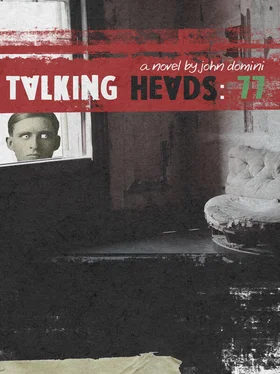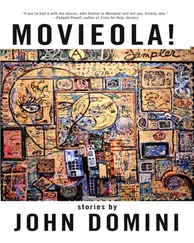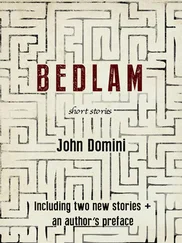Kit couldn’t trust any response more complicated than a stare. He dropped his hands but kept them fisted around his paper. Leo took advantage of the silence, shoveling on the rationale. ‘S just business. Your friends at the Globe , hey, they do this kind of business all the time. Your friends at fucking Harvard … Kit got up from the desk. He put a long stride between him and Leo’s espresso-breath, between him and that smutty gesture every time the man said “cash.” He noticed that the idea of laundering money didn’t impress the figures from Pompeii. In one fresco, a wrestling scene, two grapplers had robes over their shoulders but their genitals swung naked.
Leo swiveled left-right, following Kit. “Listen,” he said, “you told me yourself the Globe wanted to get into Monsod. You think they’re not looking for some shit to trade?”
Casting around for help, Kit recalled other times he’d been faced with shady deals. In the Midwest once, a hops vendor had dropped six hundred dollars on his desk. Just spread the bills on his desk and walked out of the office. In North Carolina there’d been talk of a lot more.
But none of those people had been paying Kit’s salary.
“Leo,” he tried, “let’s set aside the money a minute. This cash deal, let’s leave it alone for a minute.” He faced the desk. “Didn’t you say you could help me with the BBC?”
It took more than that to break the old man’s momentum. Even changing the subject, Leo kept his chest up. “Yeah, well the Building Commission, I mean. Yeah. I know some guys. Tomorrow, see, there’s this thing at Parker House. Tomorrow lunch. They want Mirinex at Parker House.”
Parker House was possibly the most prestigious hotel in the city, just across the street from the State House.
“There’s going to be the governor,” Leo said. “Ed King.”
“The governor.” Kit, laying mortar over his vocal cords, managed to match Leo’s tone. Ho hum, just another lunch with the governor.
“Him and some guys in the trades, you know. Contractors, commissioners, the usual guys.”
This was the kick Leo got out of his charade, of course. One-upping the Harvard boy made his day.
“Myself,” Leo went on, “I can’t go, really. Just can’t, you know.”
Kit sighed. You could see how the man’s daughter was still struggling with this kind of thing, struggling to find a space that didn’t have her father’s fingerprints all over it. This morning, when Kit had told Corinna and Zia he was going upstairs, the writer had turned away with an angry flinch.
“Anyway,” Leo said, “over the years, you see what I’m saying. I know some guys.”
With that Kit’s publisher fell silent again, sitting management-style for once, his hands on his desk.
“Parker House,” Kit said. “That’s at noon?”
Leo snorted. “You got balls, Kit kid.” He shook his big head. “I’ll say that, you got some fucking balls.”
Aw, balls were beside the point. Kit had nothing to lose. Regardless of what Leo might do, Sea Level had a dozen likely ways of dying.
“Didn’t I tell you,” the old man said, “this could rip you open and pull you out from the inside?”
Kit had lowered his arms. The rolled newspaper, clutched in both hands, made a bar across his crotch. He couldn’t take the money, no. He hadn’t done what small good he had, for North Carolina or the Building Commission, just to end up laundering checks. He hadn’t come this far only to discover that the first issue was nothing more than a sack of cash. He didn’t want a paper if he couldn’t also have a conscience. “Leo,” he asked, “why’d you give Sea Level your money?”
No answer; Kit tried another tack. “Leo, think about it. If something went wrong, we’d end up in front of a Grand Jury.”
“He-ey.” Leo waved a limp hand. “This isn’t the movies, Kit. Isn’t the movies, and I’m not the Mafia.”
Not the Mafia, check. “Leo, I can’t do it.”
“ Bullshit. ”
“Leo.”
“Bullshit, I can’t I can’t I can’t. What’s that, the fucking Harvard fight song? Kit, don’t you want to go to Parker House?”
“Aw, come on. Parker House isn’t the issue here.”
“You mean you really think”—Leo’s rage, more than a little bogus to begin with, gave way to bewilderment—“I’d still get you in there when you won’t do nothing for me?”
“Leo. I can’t. And as for getting into Parker House, that’s the least of my worries.”
The old man went buttonmouthed again. He went thoughtful, eerily thoughtful, his shape slack. It occurred to Kit that the wrestlers in the fresco hadn’t laid a hand on each other yet. They were still maneuvering for position.
And after Kit had gotten his lunch with the governor, the next day, it didn’t seem as if the wrestlers’ maneuvering had stopped. He didn’t have any more answers than before. Tuesday afternoon the same as Monday afternoon, Kit sat in his office, holding off on final decisions about his next issue.
On his desk lay two mockups. Two versions of Number Two. One was devoted exclusively to the penitentiary, with a banner block of 14- or 18-point type across the top half of the cover. The other offered the sort of front page editors pull off the Sale rack, three columns of news and follow-up. Clipped to the “Monsod Exclusive” mockup was a business card from the noontime meeting at Parker House, from one of the suits who’d glided around that top-floor suite. The card looked impressive, Massachusetts State Senate and all that. But Kit doubted it brought him any closer to Monsod. To him, the Parker House gathering felt like a reenactment of the inconclusive little comedy he’d played out with Leo, the action a hair overripe.
Of course Kit’s visitors, Tuesday after lunch, wanted to hear about where he’d been and who he’d been with. His Circulation Manager stopped by with the first weekend’s sales figures, then stayed to examine the card.
“Forbes Croftall, State Senator,” he read. “M’tellin’ya. A major mover there, Kit.”
“His aide, Tad,” Kit said. He pointed to the card’s upper right corner. “I only met his aide.”
“So, still. Croftall runs a couple committees, right?”
“He’s majority whip.”
“So. What are you looking so down about?”
Kit cast his eyes up the whorled glass of his office walls. “Circulation Manager,” it occurred to him, was an awfully highfalutin title. But then, what else could you put on the masthead? “He Goes to the Newsstands and Grovels?” The man had an accent that, around Boston, left him at a handicap. Every time he opened his mouth, the city’s Anglo-Protestant nomenklatura heard white trash. M’tehhllinn’yaghh . And he had a disconcerting pun of a name, Tad Close.
“M’tellin’ya, Kit. This is promising.”
“Tad. I only met his aide.”
A hickish type, the aide. A country preacher in wire-rims and a black suit. But Croftall’s man had read Kit’s piece on Monsod — the one surprise of the entire runaround lunchtime, and the single ray of hope. Kit and the aide had talked about the latest prison disturbance. Their discussion had become, in the end, just tangibly heated. While the aide’s looks had soured, their preacherly lines deepening, Kit had reminded him that a former Monsod guard was still in recovery over at Massachusetts General. Fractured skull, spinal damage. State revenues covered the costs of surgery, therapy, counseling, and job retraining. Easily more than a hundred thousand total. At last Croftall’s aide, just tangibly heated, had promised to put the story on the Senator’s desk.
Читать дальше












